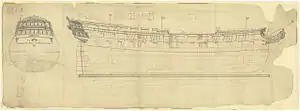HMS Powerful (1783)
HMS Powerful was a 74-gun third rate ship of the line of the Royal Navy, launched on 3 April 1783 at Blackwall Yard, London.[1]
 Plan of Powerful | |
| History | |
|---|---|
| Name: | HMS Powerful |
| Ordered: | 8 July 1780 |
| Builder: | Perry, Blackwall Yard |
| Laid down: | April 1781 |
| Launched: | 3 April 1783 |
| Fate: | Broken up 1812 |
| General characteristics [1] | |
| Class and type: | Elizabeth-class ship of the line |
| Tons burthen: | 1627 (bm) |
| Length: | 168 ft 6 in (51.36 m) (gundeck) |
| Beam: | 46 ft (14 m) |
| Depth of hold: | 19 ft 9 in (6.02 m) |
| Propulsion: | Sails |
| Sail plan: | Full-rigged ship |
| Armament: | |
Career
By 1785, her crew included John Lyddiard, an American prisoner of war forcibly enlisted into the Royal Navy in 1778, during the American Revolutionary War. In July 1785, Lyddiard wrote to the United States ambassador to Britain, John Adams, to secure Lyddiard's release.[2] In response to an appeal by Adams, the British government ordered the release of Lyddiard.[3]
In 1805 the ship arrived too late to take part in the Battle of Trafalgar but was then detached to reinforce the East India squadron. On 13 June 1806 she captured the French privateer Henriette off Trincomalee, Sri Lanka. Powerful had received intelligence of her presence in the area and set out from Trincomalee on the 11th. Powerful sighted Henriette on the morning of the 13th. After an 11-hour chase, during which Henriette fired her stern guns at Powerful without effect, Powerful succeeded in catching up to her quarry, which surrendered without further combat. During the chase, Henriette's crew had thrown four of her 6-pounder guns overboard in an attempt to lighten her and so gain speed.[4] Head money was paid for Henriette in January 1814.[5]
At the Action of 9 July 1806, disguised as an East Indiaman and together with the sloop Rattlesnake, she captured the privateer Bellone, which had been a serious threat to British trade.[6]
Fate
Powerful was broken up in 1812.[1]

Citations and notes
- Lavery, Ships of the Line vol.1, p179.
- John Lyddiard to John Adams, 20 July 1785, Founders Online, National Archives, https://founders.archives.gov/documents/Adams/06-17-02-0143. [Original source: The Adams Papers, Papers of John Adams, vol. 17, April–November 1785, ed. Gregg L. Lint, C. James Taylor, Sara Georgini, Hobson Woodward, Sara B. Sikes, Amanda A. Mathews, and Sara Martin. Cambridge, MA: Harvard University Press, 2014, pp. 261–262.]
- https://founders.archives.gov/documents/Adams/06-17-02-0275#ADMS-06-17-02-0275-fn-0002
- "No. 16013". The London Gazette. 23 March 1807. p. 378.
- "No. 16852". The London Gazette. 5 February 1814. p. 288.
- "Archived copy". Archived from the original on 11 April 2009. Retrieved 26 January 2009.CS1 maint: archived copy as title (link)
References
- Lavery, Brian (2003) The Ship of the Line - Volume 1: The development of the battlefleet 1650-1850. Conway Maritime Press. ISBN 0-85177-252-8.